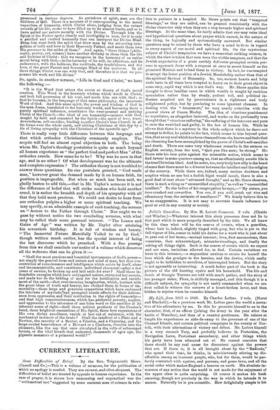CURRENT LITERATURE.
.Some Difficulties of Belief. By the Rev. Teignmouth Shore.
(Cassell and Co.)—This is a volume of sermons, for the publication of which no apology is needed. They are earnest, and often eloquent. The difficulties of belief are treated by appeals to human experience. In the case of prayer, it is shown how unmeaning and unpractical was the "arithmetical test" suggested by some eminent man of science in rela- tion to patients in a hospital. Mr. Shore points out that " temporal blessings," as they are called, can be granted consistently with the divine character only when they are a step towards higher and spiritual blessings. At the same time, he fairly admits that one may raise ideal and hypothetical questions about prayer which cannot, in the nature of the thing, be logically and systematically answered. But similar questions may be raised by those who have a mind to do so in regard to every aspect of our moral and spiritual life. On the mysterious subject of Christ's temptation we have a somewhat striking sermon, in which the view is taken that men were the visible tempters, and that the Jewish expectation of a great earthly deliverer prompted certain per- sons to approach Jesus with a request at once to assert himself as the promised Messiah and to lead them to victory. In fact, he was tempted to accept the lower position of a Jewish Mesaialtship rather than that of the spiritual Saviour of Humanity. So, too, earnest hearts and lofty souls have in all times been tempted to hurry on to their great object in some easy, rapid way which is not God's way. Mr. Shore applies this thought to those familiar cases in which wealth is sought by reckless speculation rather than by steady, patient toil, and political in- fluence acquired not by perseverance in a righteous and truly enlightened policy, but by pandering to some ignorant clamour. In dealing with the "Atonement," he very nearly coincides with the general views of Canon Mozley. The idea of vicarious punishment he repudiates, as altogether immoral, and works on the profoundly true thought that " vicarious suffering," the suffering of the innocent and pure to save the wretched and guilty, is the law of human life. While he allows that there is a mystery in the whole subject which he dares not attempt to define, he points to the fact, which seems to him beyond ques- tion, that every soul which has been cleansed from sin, knows and feels that the cleansing has been accomplished by the power of Christ's self-sacrifice and death. There are some very wholesome remarks in the sermon on English society, from the text, "Quit you like men; be strong." Mr. Shore sets his face quite against the miserable notion, which seems to find favour in some quarters among us, that an effeminately ascetic life is the true Christian ideal. And he notes, too, very truly how silly is the boast of some that there must be n divorce between the intellect and the religion of the country. While there are, indeed, many serious doubters and sceptics whom no one but a foolish bigot would insult, there is also a good deal of cant about "advanced thought," and as Mr. Shore observes, there is such a thing as " unsanctified stupidity," as well as " unsanctified intellect." To the ladies of his congregation he says,—" My sisters, you have crushed out cowardice. You can, if you will, crush out vice and effeminacy from the estimate of manliness !" We firmly believe this to be no exaggeration. It is not easy to overrate female influence for good or evil in any country or society.


































 Previous page
Previous page